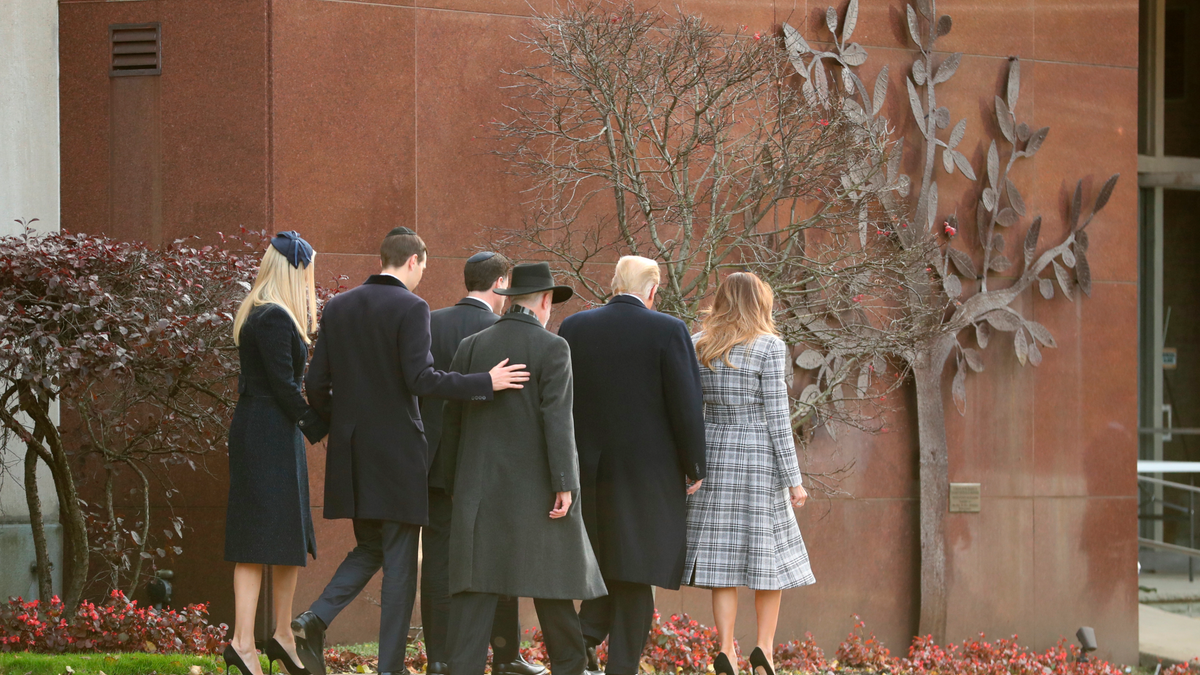
President Donald Trump and first lady Melania Trump walk into Pittsburgh's Tree of Life Synagogue in Pittsburgh, Tuesday, Oct. 30, 2018, with Ivanka Trump, back left, and Jared Kushner and Tree of Life Rabbi Jeffrey Myers, back right, and Ron Dermer, Israel's ambassador to the United States. (AP Photo/Andrew Harnik)
JERUSALEM – With President Donald Trump getting a cool welcome from the Jewish community in Pittsburgh, Israel's envoy to the memorial ceremonies for the synagogue shooting victims has come to his defense, saying it was "unfair and wrong" to link him to the tragedy.
Trump was greeted by hundreds of chanting protesters Tuesday, many accusing the president's fiery rhetoric for contributing to the climate of violence and emboldening extremists to act.
Pennsylvania's governor and the mayor of Pittsburgh declined to join Trump during the visit, and one of the families of the 11 victims of the deadliest anti-Semitic attack in U.S. history asked not to meet him. Adding to the anger was the shooting suspect's apparent targeting of a synagogue because of his outrage over a Jewish refugee agency that has become a target of conspiracy theories among Trump's nationalist base.
However, Naftali Bennett, the Israeli minister for diaspora affairs, took issue with those he said were "using this horrific anti-Semitic act to attack President Trump."
"This is unfair and wrong," said Bennett, who rushed to Pittsburgh after the shootings to offer Israel's support to city's Jewish community. "President Trump is a true friend of the state of Israel and to the Jewish people. With President Trump we never have to worry if he has our backs."
Israel's envoys to the United States and the United Nations have also tried to distance Trump from the attack.
Their defense of the president has added another element to the growing divide between Israel's leadership, which hails Trump for his staunch political backing and tough stance against nemesis Iran, and the more liberal American Jewish community, whose members are among Trump's toughest domestic critics.
Trump visited the Tree of Life synagogue and lit candles for the victims before visiting survivors in the hospital. He was accompanied by his daughter Ivanka, a convert to Judaism, and her Jewish husband, Jared Kushner, as well as Israeli Ambassador Ron Dermer.
Dermer also backed Trump, saying he was "not aware of a single non-Israeli leader that has made such a strong statement in condemning anti-Semitism."
Nancy Bernstein, co-chair of J Street Pittsburgh, a liberal American Jewish group, said that many American Jews accuse Trump of contributing to the polarized atmosphere that led to the shooting and were unhappy about Israeli leaders being so close with the president. She took particular aim at Bennett, who has been a visible presence in Pittsburgh after the shooting attack.
"He has a history of inciting against refugees in Israel, and this was the very reason that 11 people were murdered in our synagogue here," she said, referring to the alleged shooter's anger toward a Jewish group that assists immigrants in the U.S.
"As Jews, we were once refugees and immigrants," she added. "We understand what it's like to be turned away and not taken care of. Most of us get it."
The Israeli government's consistent support for Trump has far less to do with his controversial domestic policies and more with the blanket international support he has granted Israel.
Fulfilling a campaign promise, Trump recognized Jerusalem as Israel's capital and moved the U.S. Embassy there.
In a break from previous administrations, he has placed the blame for failed peace talks solely on the Palestinians and refrained from criticizing Israeli settlement activity. He also pulled out of the Iran nuclear agreement, a step welcomed by Prime Minister Benjamin Netanyahu.
Netanyahu has also angered the liberal Reform and Conservative streams of Judaism, which represent the majority of affiliated Jews in the U.S., by siding with Orthodox rabbinical authorities on issues of recognition and pluralism in Israel.
Rabbi Ammiel Hirsch of the Stephen Wise Free Synagogue in New York, a self-described "passionate Zionist" who recently met with Netanyahu to discuss Israel's relations with American Jews, said the Israeli government mishandled its response to the Pittsburgh shooting.
"What the Israelis should have done is express unity with the Jewish community, unity with American society ... and stand in solidarity," he said. "That's all."
___
Associated Press writer Josef Federman contributed to this report.

